Sankt Goarshausen
Sankt Goarshausen (abbreviated St. Goarshausen) is a town located in the Rhein-Lahn-Kreis in Nassau on the eastern shore of the Rhine, in the section known as the Rhine Gorge, directly across the river from Sankt Goar, in the German state Rhineland-Palatinate. It is located within the Nassau Nature Park and the Rhine Gorge UNESCO world heritage site, and was historically part of the Duchy of Nassau. It lies approximately 30 km south of Koblenz, and it is above all famous for the Lorelei rock nearby. Sankt Goarshausen is the seat of the Loreley collective municipality. The town's economy is based on wine making and tourism.
Sankt Goarshausen | |
|---|---|
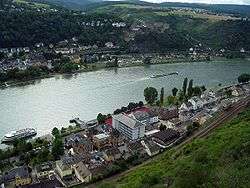 | |
 Coat of arms | |
Location of Sankt Goarshausen within Rhein-Lahn-Kreis district 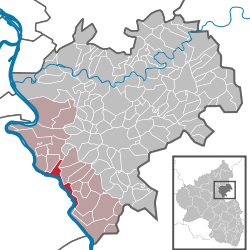 | |
 Sankt Goarshausen 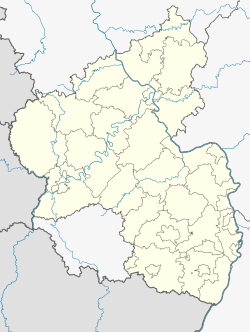 Sankt Goarshausen | |
| Coordinates: 50°9′17″N 7°42′55″E | |
| Country | Germany |
| State | Rhineland-Palatinate |
| District | Rhein-Lahn-Kreis |
| Municipal assoc. | Loreley |
| Subdivisions | 4 |
| Government | |
| • Mayor | Bernhard Roth (CDU) |
| Area | |
| • Total | 7.00 km2 (2.70 sq mi) |
| Elevation | 100 m (300 ft) |
| Population (2018-12-31)[1] | |
| • Total | 1,280 |
| • Density | 180/km2 (470/sq mi) |
| Time zone | CET/CEST (UTC+1/+2) |
| Postal codes | 56346 |
| Dialling codes | 06771 |
| Vehicle registration | EMS, DIZ, GOH |
| Website | www.sankt-goarshausen.de |
The Sankt Goarshausen railway station connects the town with Wiesbaden, Frankfurt and Koblenz. Sankt Goarshausen was formerly the terminus of the Nassau Light Railway line between Sankt Goarshausen and Nastätten.
History
In 1885, St. Goarshausen had almost 1,456 inhabitants. Close to the town in the hillside just above it, lie the ruins of 14th century Castle Katz, ruined since 1806.
Demographics
Traditionally more than 60% of the population are Protestants, while around 30% are Catholics; however Sankt Goarshausen is located in close proximity to Catholic-majority areas where the reverse situation exists. Due to the abandonment of religious beliefs, fewer people are members of the churches today, whether Protestant or Catholic. Sankt Goarshausen had a small but well-established Jewish community from the 17th century to the 1930s, peaking at 2.4% in 1895.[2] As of 1860, the district of St. Goarshausen, which included St. Goarshausen proper and its surrounding villages, had a population that included 8557 Protestants, 3840 Catholics, 110 Jews and 6 Mennonites.[3]
Economy
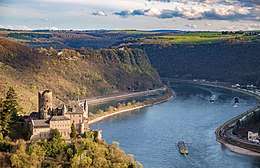
The town has 1,585 inhabitants as of December 31, 2002, and is the seat of the township association (Verbandsgemeinde) Loreley. With the villages Ehrental, Wellmich and Heide, the number of inhabitants is over 2,000.
The most important economic areas for St. Goarshausen are tourism and wine making. In earlier times was the town an important place along the Rhein for fishing and as an embarcation area. Today, the formerly very busy town is losing its importance and relies more and more on tourism. Especially problematic for St. Goarshausen is the short distance to the larger city Nastätten, that has replaced St. Goarshausen as the regional centre.
In tourism, the biggest competitor is the twin city St. Goar on the other shore of the Rhine. St. Goar is only reachable by ferry, as the closest bridge is 30 km away. While there is an established need for a bridge across the Rhine, plans for connecting the towns have not yet been realised.
To help tourism, a visitors centre has been established in connection to the Lorelei rock.
Sights
The most famous point in town, that also brings the most tourists is the site of the Lorelei rock.
In St. Goarshausen there are two castles, Burg Katz (English: Castle Cat, formerly Burg Neu-Katzenelnbogen) and Burg Maus (English: Castle Mouse). Burg Katz is not open for visitors. There is a good view over the town from Burg Maus, and also visible are the ruins of Burg Rheinfels on the other side of Rhine.
Recurring events
- The third weekend of September: Rhein in Flammen, large fireworks from Burg Katz in St. Goarshausen, Burg Rheinfels in St. Goar and from the middle of the Rhine.
Gallery
 View of St. Goarshausen
View of St. Goarshausen- Burg Katz, above St. Goarshausen
 St. Goarshausen, by Thomas M. Richardson
St. Goarshausen, by Thomas M. Richardson Loreley Rock
Loreley Rock St. Goarshausen
St. Goarshausen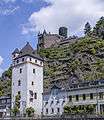 St. Goarshausen
St. Goarshausen Castle Katz
Castle Katz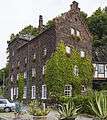 Secthaus St. Goarshausen
Secthaus St. Goarshausen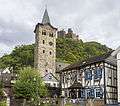 St. Goarshausen - Wellmich
St. Goarshausen - Wellmich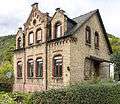 St. Goarshausen - Wellmich
St. Goarshausen - Wellmich St. Goar
St. Goar Castle Rheinfels
Castle Rheinfels Bust of Heinrich Heine
Bust of Heinrich Heine
References
- "Bevölkerungsstand 2018 - Gemeindeebene". Statistisches Landesamt Rheinland-Pfalz (in German). 2019.
- Sankt Goarshausen, Alemannia Judaica
- Staats- und Adreß-Handbuch des Herzogthums Nassau für das Jahr 1860, p. 130, Wiesbaden, Government of the Duchy of Nassau
External links
| Wikivoyage has a travel guide for Sankt Goarshausen. |
- About Verbandsgemeinde Loreley, with map (in German)
- Official website
